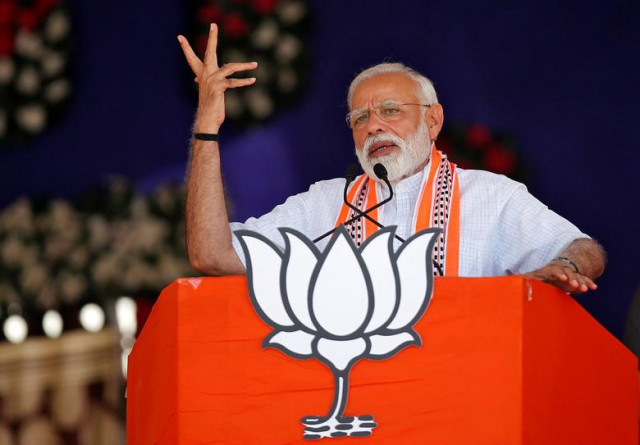Breaking down Modi’s populism
The political approach that believes in employing highly emotional rhetoric, based on opportunistic policies

Indian Premier Narendra Modi. PHOTO: REUTERS/File
This specific brand of politics using populism as a veil to cover their nationalistic and sometimes extreme ideology is gaining currency in political arenas.
In order to comprehend the nature of their narrative, it is important to look at the basic definition of populism. Cas Mudde, a Dutch political scientist, was convinced that populism as a political approach believes in employing “highly emotional and simplistic rhetoric” and it is fundamentally based on “opportunistic policies” that focus on garnering the support of voters. He further laid out the stark division in society between “the elites” and “the people” while simultaneously focusing on the belief that populists adhere to the “general will” — a group of desires shared by the ordinary people. Similarly, CNN journalist Fareed Zakaria believes that populism speaks for the “forgotten ordinary person”, claiming it to be the “voice of genuine patriotism”.
From the aforementioned understanding, one can easily relate to the rhetoric of right-wing leaders emerging in various capitals across the nations. Prime Minister Modi contested the recent elections on an extremely simplistic yet appealing slogan “main apka chowkidar” i.e. I am your watchman. In a highly nationalistic environment, it was evident that this slogan would gain swift acceptance while reinforcing the plausibility of being a “chowkidar” through limited military actions against Pakistan. Meanwhile, the Indian media was on the verge of elevating Modi to the status of a messiah, thus featuring his divisive speeches and displaying his aggressiveness towards Pakistan with much valour and glory, maintaining such a narrative through renowned journalists.
The ideology of the “chowkidar” is based on the basic concept of national interest, which Modi has skillfully utilised to ignite the raw emotions of the ordinary people. Along with this ideology, Modi has been consistently employing the colonial technique of “divide and rule” also known as “us versus them”. After successfully pitching Hindus against Muslims, which has led to widespread extermination of the Muslim community, Prime Minister Modi aims to cleanse India of its huge Muslim population in order to not only “purify” the Hindu race but also enforce the BJP and Hindutva ideology of equating Hinduism with the Indian identity.
Such genocidal activities are rampant in the secular and “modern” India where income inequality is growing at an alarming rate. As long as politics of hatred and division prevails, more Ambanis — who sponsor such hate-riddled propaganda while moulding state policies to meet their exploitative business objectives — will emerge. The forgotten ordinary has been deluded into believing that the “ordinary Modi” will safeguard their interests from “Gandhi’s elitist policies”.
Similar perception is prevalent in Pakistan where Prime Minister Imran Khan is driving a rigorous corruption campaign against the “elitist” politicians. He has repeatedly referred to the Chinese model of eliminating the roots of corruption and normalising the public execution of 500 corrupt individuals. Over the years, Pakistanis have grown extremely tired of the rampant corruption that the country is plagued by thus believing it to be the sole cause of all ills. In such an environment, the slogan of “Naya Pakistan” touched the hearts of ordinary Pakistanis. Therefore, it is important to look at the developments in the country through the populist lens in order to find out if “Naya Pakistan” is an illusion or a reality.
Published in The Express Tribune, October 17th, 2019.
Like Opinion & Editorial on Facebook, follow @ETOpEd on Twitter to receive all updates on all our daily pieces.















COMMENTS
Comments are moderated and generally will be posted if they are on-topic and not abusive.
For more information, please see our Comments FAQ